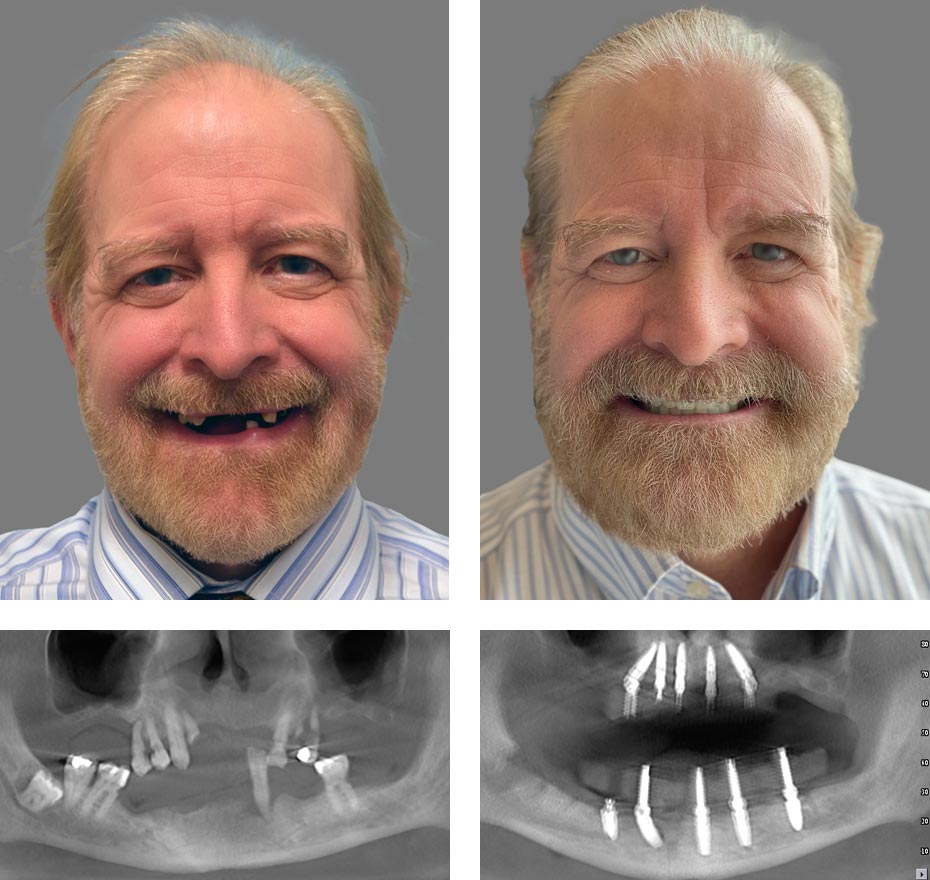Frequently Asked Questions
Explore whether “all on four” or “same day” dental implants may be right for you. This amazing new technology speeds up the process of dental implants. Find out if you qualify.
FOR A FREE CONSULTATION, CALL (415) 992-9188.
Below are some of the most frequently asked questions patients have about dental implants. If you have any other questions, or would like to schedule an appointment, we would love to hear from you at (415) 992-9188.
Click on a question below to see the answer.
Call us today for your consultation! (415) 992-9188 | Click here to learn about Dr. Rabinovich and dental implants via video.
What are the Benefits of Dental Implants?
Implants offer many benefits, including:
- Fixed Positioning — preservation of your existing jawbone and gum tissue
- Prevention of bone atrophy — avoid that premature “sunken-in” appearance
- Functionally and aesthetically indistinguishable from your natural teeth
- A superior bite pressure that is equal to your natural teeth
- A success rate and longevity are far superior to any other restoration
- Conservation — requires no removal of adjacent teeth structure
- Never develop decay and never require root canals
- Denture wearers — never again worry about glues or adhesives, wobbling or clicking
- Denture wearers — improve your chewing and speaking abilities
Precautions for Dental Implant Treatment?
Dental implants should not be used in patients who have inadequate amounts of bone to permit placement of implants in sufficient size and numbers to support their biomechanical loads. Mechanical failures, including fatigue fracture of implants, prosthetic screws, and/or abutment screws, may occur if dental implants are insufficient in size or number to support their biomechanical loads, or are not properly positioned. To reduce the risk of overload or fatigue failure, dentists must place the implants and design prosthetics to accommodate the physical or medical conditions of their patients, such as bruxism (i.e., grinding or clenching of teeth) or unfavourable jaw relationships.
What are Dental Implants?
Dental implants are small screws designed to replace the root of a tooth and restore the physical appearance and the chewing function of patients with partial or full tooth loss. Dental implants are intended for use in either the upper and/or the lower jaw to support prosthetic devices, such as artificial teeth. By integrating with the jaw, they enable restorations that range from replacement of one single tooth to an entire arch of bridgework, or as stabilizing elements for overdenture applications. We use dental implants made from titanium, which is both biocompatible and strong.
What is the Purpose of a Dental Implant?
A dental implant can serve three purposes. It can function:
- As an artificial root for a single tooth replacement
- As an anchor for a fixed or removable prosthesis that replaces multiple teeth
- As a foundation for a full bridge or full dentures
Are you a Good Candidate for Dental Implants?
Patients must undergo a medical evaluation to determine whether the implant placement procedure poses any health risks, and whether any factors exist that may affect the healing capacity of either their bones or their associated soft tissues.
Who can Receive Dental Implants?
Patients who are medically fit to participate in a general oral surgical procedure.
Who Should Carefully Consider Dental Implants?
Patients who have medical or other conditions that may interfere with the healing process of either their bones or soft tissues (e.g., connective tissue disorders, steroid therapy, bone infections, cigarette smoking) must carefully evaluate, with their dentists, the potential risks and benefits of using dental implants.
Schedule a Consultation with Us Today
Full arch dental implants offer a transformative solution for individuals with significant tooth loss. By providing a stable, natural-looking, and long-lasting restoration, they help restore functionality, improve appearance, and boost confidence.
Interested? Please contact us to see if ‘teeth in a day’ is an option for you at our convenient San Francisco office. Call the San Francisco Dental Implant today at (415) 992-9188, or email us at info@doctorrabinovich.com.


